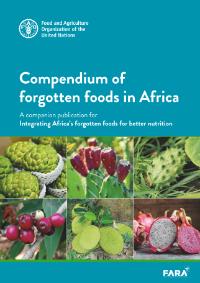The “Compendium of Forgotten Foods in Africa” is a remarkable publication which has emerged to shed light on a treasure trove of forgotten foods scattered across the African continent. This publication serves as a beacon of hope, offering a roadmap for integrating these neglected gems into the culinary landscape for improved nutrition and sustainable development. This
Published by the Food and Agriculture Organization (FAO), this compendium is a testament to the rich biodiversity and cultural heritage that underpin Africa’s food systems.
The concept of a food system, as defined by the World Wide Fund for Nature, encompasses a complex web of interactions involving people, institutions, processes, and infrastructure. In Africa, however, these systems often falter, failing to meet the needs of growing populations while neglecting environmental and social sustainability. Transforming these food systems is not just a goal but imperative for achieving the United Nations’ Sustainable Development Goals.
At the heart of this transformation lies the revival of forgotten foods—indigenous crops that have sustained communities for millennia. Once cherished for their nutritional, medicinal, and cultural value, these crops have gradually faded into obscurity as imported varieties took precedence. The rise of monoculture and homogenized diets further marginalized these native treasures, relegating them to “forgotten crops.”
But the tide is turning. With the realization that traditional crops hold the key to resilient and sustainable food systems, efforts are underway to rediscover, conserve, and promote these forgotten foods. From ancient grains like fonio and teff to nutrient-rich tubers like African yam bean and Bambara groundnut, Africa’s biodiversity offers many untapped resources.
Reviving these forgotten foods is not merely a nostalgic pursuit; it’s a pathway to prosperity. By reintegrating native crops into agricultural practices, communities can enhance food and nutrition security, promote biodiversity conservation, and bolster local economies. Moreover, these resilient crops are well-suited to Africa’s diverse agroecological conditions, offering a buffer against climate change and ensuring food sovereignty for future generations.
However, the journey towards a revitalized food system is fraught with challenges. Overcoming the legacy of neglect and promoting the adoption of traditional crops requires a multifaceted approach. It demands investment in research and development, support for smallholder farmers, and the creation of enabling policies that value and protect indigenous knowledge.
As the “Compendium of Forgotten Foods in Africa” becomes available to policymakers, researchers, and farmers across the continent, it serves as a rallying cry for change. It is a call to embrace the wisdom of the past and chart a course towards a more sustainable and inclusive food future. The words of the FAO are a reminder that the seeds of resilience and abundance lie within Africa’s forgotten foods, waiting to be rediscovered and celebrated.
Read and download the publication here.
Publication by FAO

